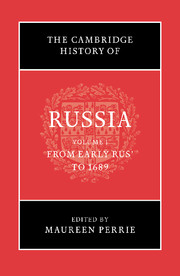Book contents
- Frontmatter
- 1 Introduction
- 2 Russia’s geographical environment
- Part I Early Rus’ and the Rise of Muscovy (c. 900–1462)
- Part II The Expansion, Consolidation and Crisis of Muscovy (1462–1613)
- Part III Russia Under the First Romanovs (1613–1689)
- 19 The central government and its institutions
- 20 Local government and administration
- 21 Muscovy at war and peace
- 22 Non-Russian subjects
- 23 The economy, trade and serfdom
- 24 Law and society
- 25 Urban developments
- 26 Popular revolts
- 27 The Orthodox Church and the schism
- 28 Cultural and intellectual life
- Bibliography
- Index
- Plate section"
- Plate section"
- References
24 - Law and society
from Part III - Russia Under the First Romanovs (1613–1689)
Published online by Cambridge University Press: 28 March 2008
- Frontmatter
- 1 Introduction
- 2 Russia’s geographical environment
- Part I Early Rus’ and the Rise of Muscovy (c. 900–1462)
- Part II The Expansion, Consolidation and Crisis of Muscovy (1462–1613)
- Part III Russia Under the First Romanovs (1613–1689)
- 19 The central government and its institutions
- 20 Local government and administration
- 21 Muscovy at war and peace
- 22 Non-Russian subjects
- 23 The economy, trade and serfdom
- 24 Law and society
- 25 Urban developments
- 26 Popular revolts
- 27 The Orthodox Church and the schism
- 28 Cultural and intellectual life
- Bibliography
- Index
- Plate section"
- Plate section"
- References
Summary
Addressing the interconnections of ‘law and society’ in seventeenth-century Muscovy is challenging, because of the complexity of the judicial system. Russia was far from the uniformity in law, adjudication and procedure that the contemporary European Polizeistaat was striving for (and even there the goal was achieved more in the breach than the norm). In its multiplicity of venues and legal norms and in the flexibility of the enforcement of those norms, Russian justice was decidedly medieval.
This is not to say that the state was passive in the legal arena. Codification and centralisation of judicial power were, indeed, key goals of seventeenth-century rulers. But their ambition exceeded reality. Moscow’s rulers were hindered by the challenge of administering an empire that was immense, ethnically diverse and riddled with pockets of immunity. This chapter will explore that complexity by surveying the multiple venues of legal proceedings in Muscovy, then by examining judicial practice and finally by surveying changes in the positive law.
Judicial venues
In principle a centralised bureaucratic structure of chancelleries in Moscow and regional governors in the provinces provided the judicial system in the seventeenth century. Chancelleries sent governors, called voevody, to appointed regions. They exercised administrative, fiscal and judicial authority; they often oversaw subordinate officials and courts in smaller towns. On paper the system was hierarchical and empire wide. In practice, however, many groups and regions fell out of range of the governor’s authority because of explicit or implicit charters of judicial immunity, religious, ethnic or colonial status, or personal dependency.
Keywords
- Type
- Chapter
- Information
- The Cambridge History of Russia , pp. 559 - 578Publisher: Cambridge University PressPrint publication year: 2006

